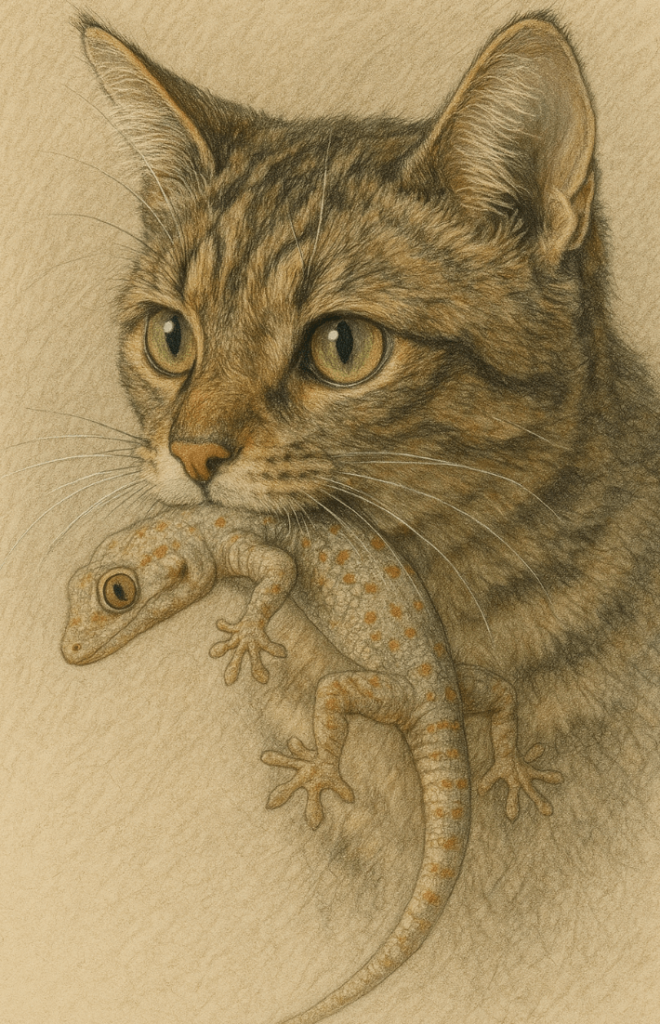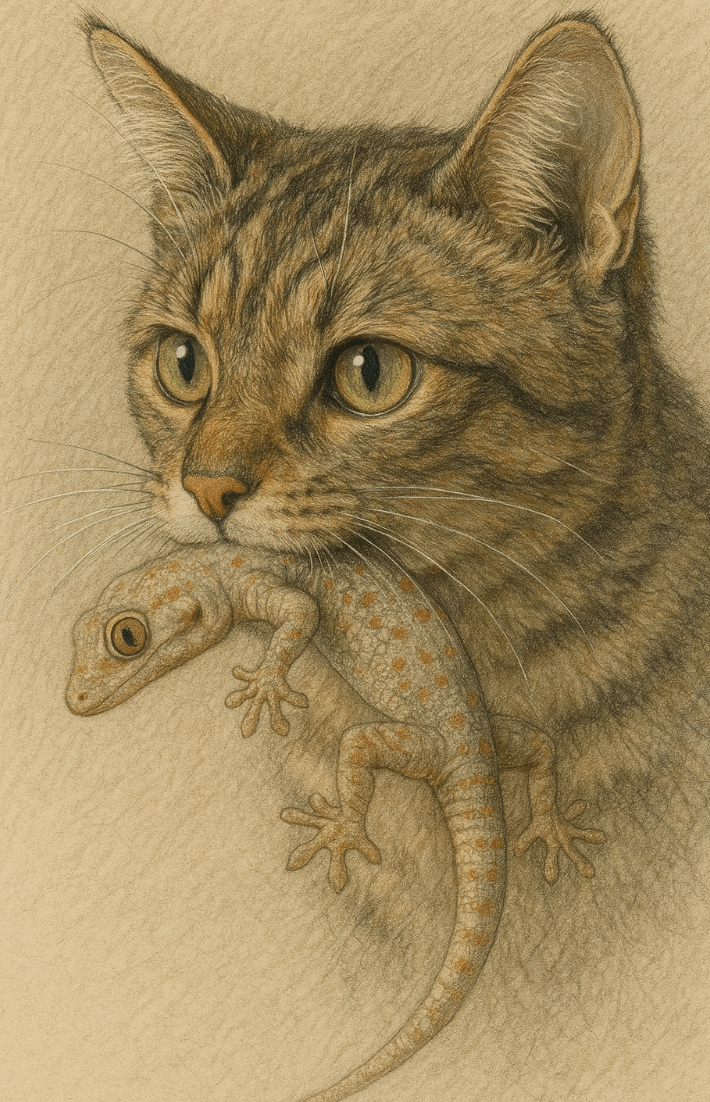Can Cats Eat Geckos? What You Need to Know
Cats are natural hunters, and their curious nature often leads them to chase small creatures like geckos. But if your feline friend catches and eats a gecko, should you be concerned? While geckos themselves aren’t inherently toxic to cats, there are several factors to consider before dismissing the incident as harmless. From potential health risks to behavioral insights, understanding what happens when cats eat geckos is essential for keeping your pet safe. In this blog post, we’ll explore everything you need to know about cats and geckos, including possible dangers, preventive measures, and expert advice to ensure your cat stays healthy and happy.
Potential Risks of Cats Eating Geckos
While geckos may seem like harmless prey, there are several risks associated with cats eating them. These dangers can range from minor discomfort to serious health issues, depending on the situation.
Parasites and Bacteria:
Geckos can carry parasites like roundworms or harmful bacteria such as Salmonella, which can infect your cat upon ingestion.Toxins from Pest Control:
If the gecko has been exposed to pesticides or insecticides, these toxins can transfer to your cat and cause poisoning.Choking Hazard:
Small bones or parts of the gecko can become lodged in your cat’s throat, leading to choking or respiratory distress.Digestive Blockages:
Undigested pieces of the gecko, such as bones or skin, may cause blockages in your cat’s digestive tract, requiring veterinary intervention.Allergic Reactions:
Though rare, some cats may have allergic reactions to proteins found in geckos, resulting in symptoms like vomiting or diarrhea.
These risks highlight why it’s important to monitor your cat’s interactions with wildlife and take action if they consume something unusual.
Signs Your Cat May Be in Trouble After Eating a Gecko
If your cat has eaten a gecko, it’s crucial to watch for signs of distress or illness. Early detection of problems can prevent complications and ensure timely treatment.
Vomiting or Diarrhea:
These symptoms may indicate gastrointestinal upset or an allergic reaction to the gecko.Lethargy or Weakness:
A sudden lack of energy could signal poisoning or an infection caused by parasites or bacteria.Loss of Appetite:
If your cat refuses to eat after consuming a gecko, it may be experiencing discomfort or illness.Excessive Drooling:
Drooling can suggest irritation in the mouth or throat, possibly from toxins or sharp bone fragments.Difficulty Breathing:
Labored breathing may indicate choking or respiratory issues caused by ingested material.
Recognizing these signs early allows you to seek veterinary care promptly, ensuring your cat’s well-being.
Check this guide 👉Can Cats Eat Apple Cider Vinegar? Best 7 Expert Tips!
Check this guide 👉Can Cats Eat Capers? Best 7 Expert Tips!
Check this guide 👉Can Cats Eat Alfalfa Sprouts? Best 7 Expert Tips!

Preventive Measures for Cats and Geckos | Risks of Cats Eating Geckos |
|---|---|
Supervise outdoor time closely | Exposure to parasites or bacteria |
Use deterrents to keep geckos away | Potential poisoning from pest control |
Train your cat to avoid hunting | Choking hazards from small bones |
Provide alternative toys for stimulation | Digestive blockages from undigested parts |
Schedule regular vet check-ups | Allergic reactions to gecko proteins |
How to Prevent Your Cat from Eating Geckos
Preventing your cat from hunting and eating geckos requires proactive measures. By implementing these strategies, you can reduce the likelihood of such incidents and keep your cat safe.
Limit Outdoor Access:
Keep your cat indoors or in a secure outdoor enclosure to minimize encounters with geckos and other wildlife.Use Deterrents for Geckos:
Natural repellents or gecko-proofing your home can help keep these reptiles out of your cat’s reach.Provide Mental Stimulation:
Engage your cat with interactive toys, puzzles, and playtime to redirect their hunting instincts.Train Your Cat:
Use positive reinforcement techniques to teach your cat commands like “leave it” or “stay” when they show interest in geckos.Monitor Behavior Closely:
Pay attention to your cat’s activities, especially during dawn and dusk when geckos are most active.
By taking these steps, you can create a safer environment for your cat while respecting their natural instincts.
What to Do If Your Cat Eats a Gecko
If your cat manages to catch and eat a gecko, staying calm and taking immediate action is key. Here’s what you should do in this situation.
Observe for Symptoms:
Watch your cat closely for any signs of illness or distress over the next 24-48 hours.Contact Your Veterinarian:
Even if your cat seems fine, it’s wise to consult your vet for advice on whether further action is needed.Avoid Inducing Vomiting Without Guidance:
Never attempt to make your cat vomit unless instructed by a professional, as this can cause additional harm.Keep Records of Incidents:
Note details like when the gecko was eaten and any changes in your cat’s behavior to share with your vet.Inspect Your Home for Geckos:
Take steps to remove geckos from your living space to prevent future incidents.
Promptly addressing the situation ensures your cat receives the care they need and minimizes risks.
Common Misconceptions About Cats and Geckos
There are several misconceptions about cats eating geckos that can lead to confusion or complacency. Clarifying these myths helps you make informed decisions about your cat’s safety.
Geckos Are Always Safe for Cats to Eat:
While geckos aren’t inherently toxic, they can carry parasites or toxins that pose risks to your cat.Indoor Cats Can’t Encounter Geckos:
Geckos can sneak into homes, so even indoor cats aren’t completely safe from encounters.Cats Will Naturally Avoid Harmful Prey:
Cats rely on instinct, not judgment, and may eat something dangerous without realizing it.Eating a Gecko Is No Big Deal:
Even if your cat seems fine, underlying issues like infections or blockages can develop later.Training Won’t Stop Hunting Behavior:
While hunting is instinctual, training and environmental enrichment can significantly reduce the urge to chase geckos.
Understanding these truths ensures you’re better prepared to handle incidents involving geckos.
Health Considerations for Cats After Eating Geckos
After your cat eats a gecko, certain health considerations should be top of mind. Being aware of these factors helps you act quickly if complications arise.
Parasitic Infections:
Geckos can harbor parasites like roundworms, which may infect your cat and require deworming treatment.Bacterial Infections:
Harmful bacteria such as Salmonella can transfer to your cat, leading to gastrointestinal issues.Poisoning Risks:
If the gecko consumed poison (e.g., pest control chemicals), your cat may also ingest these toxins indirectly.Internal Injuries:
Sharp bones or fragments from the gecko can cause damage to your cat’s mouth, throat, or digestive system.Long-Term Monitoring:
Some symptoms may not appear immediately, so ongoing observation is essential for catching delayed reactions.
Proactive monitoring ensures your cat receives timely care if any issues arise.
Fun Ways to Redirect Your Cat’s Hunting Instincts
Redirecting your cat’s hunting instincts toward safer activities can reduce their interest in geckos and other small prey. These ideas provide mental and physical stimulation while keeping your cat entertained.
Interactive Toys:
Wand toys, laser pointers, and feather teasers mimic prey movements, satisfying your cat’s hunting drive.Puzzle Feeders:
Food-dispensing puzzles encourage problem-solving and reward your cat with treats or kibble.Catnip-Filled Toys:
Toys infused with catnip stimulate play and distract your cat from real prey.Window Perches:
Installing a perch near a window lets your cat observe birds and insects safely from indoors.Outdoor Enclosures:
Secure outdoor enclosures allow your cat to explore nature without encountering geckos or other wildlife.
Engaging your cat with these alternatives satisfies their instincts while protecting them from potential dangers.
Frequently Asked Questions About Cats Eating Geckos
Are geckos poisonous to cats?
No, geckos themselves are not toxic, but they can carry parasites, bacteria, or toxins from pest control that may harm your cat.
What should I do if my cat vomits after eating a gecko?
Contact your veterinarian immediately to determine if further treatment is necessary.
Can indoor cats encounter geckos?
Yes, geckos can enter homes through small openings, so it’s important to gecko-proof your space.
How can I stop my cat from hunting geckos?
Provide mental stimulation, use deterrents, and supervise outdoor time to reduce opportunities for hunting.
Do all cats eat geckos?
Not all cats will eat geckos, but their hunting instincts make them likely to chase and potentially consume small prey.
Keeping Your Cat Safe Around Geckos
While cats eating geckos isn’t always an emergency, it’s important to remain vigilant and informed about the potential risks. By understanding the dangers, recognizing warning signs, and taking preventive measures, you can ensure your cat’s safety and well-being. Remember, curiosity is part of what makes cats such wonderful companions, but it’s up to us to protect them from harm. With a little effort and attention, you can create a harmonious environment where both your cat and local wildlife coexist peacefully.
Do Cats Have Taste Buds? Best 7 Expert Tips! – Discover how cats experience flavors and why their taste is so unique.
Do Dogs Have Taste Buds? Best 7 Expert Tips! – Discover how dogs experience taste, their preferences, and what it means for their diet and health.
Can Cats Taste Sweet? Best 7 Expert Tips! – Discover why cats can’t taste sweetness, how it affects their diet, and tips to keep them healthy and happy.
Can Dogs Taste Sweet? Best 7 Expert Tips! – Discover how dogs perceive sweetness, which foods are safe, and tips to manage their sweet cravings responsibly.





